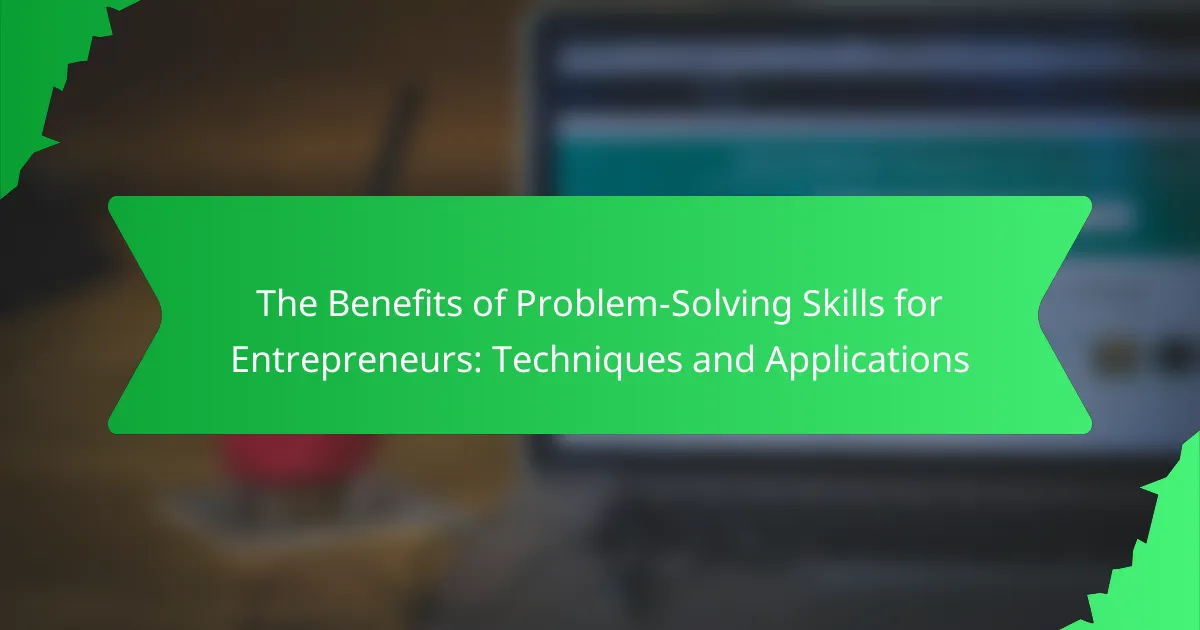Problem-solving skills are essential abilities that enable entrepreneurs to identify solutions to challenges in complex business environments. This article explores the significance of these skills in achieving business success, highlighting their role in innovative thinking, effective decision-making, and resource management. It outlines various techniques for developing problem-solving skills, including critical thinking, brainstorming, scenario planning, and networking. Additionally, the article discusses practical applications of these skills, such as market analysis, decision-making under pressure, fostering innovation, and improving team dynamics, all of which contribute to sustainable entrepreneurial success.

What are Problem-Solving Skills and Why are They Important for Entrepreneurs?
Problem-solving skills are the abilities that enable individuals to identify solutions to challenges and obstacles. These skills are crucial for entrepreneurs as they navigate complex business environments. Entrepreneurs frequently encounter issues that require innovative thinking and effective decision-making. Strong problem-solving skills allow them to analyze situations, evaluate options, and implement solutions efficiently. According to a study published in the Journal of Business Venturing, entrepreneurs with effective problem-solving abilities are more likely to achieve business success. This correlation highlights the importance of these skills in overcoming obstacles and seizing opportunities in the marketplace.
How do Problem-Solving Skills Impact Entrepreneurial Success?
Problem-solving skills significantly enhance entrepreneurial success. These skills enable entrepreneurs to identify challenges and develop effective solutions. Entrepreneurs face various obstacles, from market competition to operational inefficiencies. Strong problem-solving abilities allow them to navigate these issues efficiently. Research indicates that businesses led by effective problem solvers tend to outperform their competitors. A study by the Harvard Business Review found that 80% of successful entrepreneurs cited problem-solving as a critical skill. This capability fosters innovation and adaptability, essential traits in a dynamic business environment. Ultimately, effective problem-solving leads to better decision-making and improved business outcomes.
What specific challenges do entrepreneurs face that require problem-solving skills?
Entrepreneurs face several specific challenges that require problem-solving skills. One major challenge is financial management. Entrepreneurs must create budgets and manage cash flow effectively. Poor financial decisions can lead to business failure. Another challenge is market competition. Entrepreneurs need to differentiate their products or services. They must analyze competitors and adjust strategies accordingly. Additionally, entrepreneurs often deal with resource constraints. Limited time and manpower require creative solutions to maximize productivity. Customer acquisition and retention also pose challenges. Entrepreneurs must develop effective marketing strategies to attract and keep customers. Lastly, navigating regulatory compliance is critical. Entrepreneurs must understand laws and regulations affecting their industry. Each of these challenges necessitates strong problem-solving skills to ensure business success.
How can effective problem-solving lead to better decision-making?
Effective problem-solving enhances decision-making by providing structured approaches to analyze situations. This structured approach allows individuals to identify root causes of issues accurately. When entrepreneurs apply effective problem-solving techniques, they can evaluate options more thoroughly. This evaluation leads to informed choices based on data rather than assumptions. Research indicates that structured problem-solving improves outcomes in business environments. For instance, a study by the Harvard Business Review found that companies using systematic problem-solving increased their decision-making speed by 25%. This speed translates to better agility in responding to market changes. Thus, effective problem-solving directly contributes to making better, more timely decisions.
What are the Key Components of Effective Problem-Solving Skills?
The key components of effective problem-solving skills include critical thinking, creativity, decision-making, and emotional intelligence. Critical thinking allows individuals to analyze situations logically and evaluate potential solutions. Creativity fosters innovative approaches to overcoming obstacles. Decision-making involves selecting the best course of action from available options. Emotional intelligence helps individuals understand their emotions and those of others, facilitating better collaboration. Each component contributes to a comprehensive skill set that enhances problem-solving abilities, leading to more effective and efficient outcomes in various situations.
What role does critical thinking play in problem-solving?
Critical thinking is essential in problem-solving as it enables individuals to analyze situations logically. It helps to identify the root cause of problems rather than just addressing symptoms. Critical thinkers evaluate information objectively and consider multiple perspectives. This process leads to informed decision-making and effective solutions. Research shows that critical thinking improves problem-solving outcomes significantly. According to a study published in the Journal of Educational Psychology, students who practiced critical thinking skills performed better in problem-solving tasks. Thus, critical thinking directly enhances the ability to solve problems efficiently.
How does creativity enhance problem-solving abilities?
Creativity enhances problem-solving abilities by enabling individuals to generate diverse solutions. It fosters innovative thinking, allowing for unique approaches to challenges. Creative individuals often view problems from multiple perspectives. This broadens their understanding of the issue at hand.
Research by the American Psychological Association shows that creativity can improve cognitive flexibility. Cognitive flexibility is crucial for adapting to new situations. A study published in the journal “Thinking Skills and Creativity” found that creative problem-solving leads to more effective outcomes. Participants who employed creative techniques solved problems faster and more efficiently.
Moreover, creativity encourages risk-taking and experimentation. This willingness to explore alternative solutions can uncover hidden opportunities. In summary, creativity significantly boosts problem-solving capabilities through diverse thinking and innovative approaches.

What Techniques Can Entrepreneurs Use to Develop Problem-Solving Skills?
Entrepreneurs can develop problem-solving skills through various techniques. One effective technique is practicing critical thinking. Critical thinking helps entrepreneurs analyze situations and make informed decisions. Another technique is engaging in brainstorming sessions. Brainstorming encourages creative solutions and collaboration among team members.
Additionally, entrepreneurs can utilize the technique of scenario planning. This method involves imagining different future scenarios and preparing strategies for each. Experimentation is also crucial. Testing new ideas allows entrepreneurs to learn from failures and successes.
Networking with other entrepreneurs offers insights into diverse problem-solving approaches. Learning from others’ experiences can enhance one’s own skills. Lastly, attending workshops or training sessions focused on problem-solving can provide structured learning opportunities. These techniques collectively foster a robust problem-solving ability essential for entrepreneurial success.
How can structured problem-solving frameworks aid entrepreneurs?
Structured problem-solving frameworks aid entrepreneurs by providing systematic approaches to identify and resolve challenges. These frameworks help in breaking down complex problems into manageable components. Entrepreneurs can use these methods to analyze situations logically and make informed decisions. For instance, the use of frameworks like SWOT analysis enables entrepreneurs to evaluate strengths, weaknesses, opportunities, and threats effectively. Additionally, employing techniques such as the PDCA (Plan-Do-Check-Act) cycle facilitates continuous improvement. Research shows that businesses utilizing structured approaches to problem-solving report higher success rates. According to a study by the Harvard Business Review, organizations that adopt structured problem-solving frameworks see a 20% increase in operational efficiency.
What are some popular problem-solving methodologies?
Popular problem-solving methodologies include the Scientific Method, Design Thinking, and Root Cause Analysis. The Scientific Method involves systematic observation and experimentation to test hypotheses. Design Thinking focuses on understanding user needs and creating innovative solutions through empathy. Root Cause Analysis seeks to identify the underlying causes of problems to prevent recurrence. Each methodology provides a structured approach to tackle challenges effectively. These methodologies are widely used in various fields, including business and engineering, to enhance decision-making and innovation.
How can entrepreneurs apply these methodologies in real-world scenarios?
Entrepreneurs can apply problem-solving methodologies by implementing structured approaches to challenges. They can use techniques like the SWOT analysis to identify strengths, weaknesses, opportunities, and threats. This method helps clarify business positions and guide strategic decisions.
Additionally, entrepreneurs can employ the Design Thinking framework to innovate products and services. This involves empathizing with users, defining problems, ideating solutions, prototyping, and testing. This iterative process enhances customer satisfaction and drives market relevance.
Furthermore, entrepreneurs can adopt Lean Startup principles to minimize waste and maximize learning. This method encourages rapid experimentation and validated learning. Entrepreneurs can pivot based on feedback, ensuring they meet market demands effectively.
Research shows that companies utilizing these methodologies report higher success rates. For instance, a study by the Harvard Business Review found that businesses applying structured problem-solving methods are 30% more likely to achieve their goals.
What role does collaboration play in enhancing problem-solving skills?
Collaboration significantly enhances problem-solving skills by leveraging diverse perspectives. When individuals work together, they combine their unique experiences and knowledge. This collective input leads to more creative solutions. Research indicates that teams are often more effective than individuals in solving complex problems. A study by the Institute for Corporate Productivity found that collaborative teams are 5 times more likely to solve problems effectively. Furthermore, collaboration encourages open communication, which fosters a deeper understanding of issues. This shared dialogue helps identify root causes and potential solutions more efficiently. Ultimately, collaboration not only improves the quality of solutions but also accelerates the problem-solving process.
How can teamwork improve the problem-solving process?
Teamwork enhances the problem-solving process by combining diverse perspectives and skills. This diversity leads to more creative solutions. Collaborative brainstorming sessions can generate a wider range of ideas. Studies show that teams often outperform individuals in complex problem-solving tasks. For instance, research by Hackman and Oldham indicates that teamwork can improve decision-making quality. Additionally, shared responsibility in teams can reduce pressure on individuals. This allows for more thorough analysis of problems. Effective communication within teams fosters clarity and understanding. Overall, teamwork is crucial for effective problem-solving in entrepreneurial contexts.
What strategies can entrepreneurs use to foster a collaborative environment?
Entrepreneurs can foster a collaborative environment by promoting open communication. This involves creating channels for team members to share ideas freely. Regular team meetings can enhance transparency and encourage participation. Implementing collaborative tools, such as project management software, can facilitate teamwork. Encouraging diversity in teams can bring varied perspectives and ideas. Establishing clear goals ensures that all team members work towards a common objective. Providing recognition and rewards for collaborative efforts can motivate employees to engage with each other. Research shows that companies with collaborative cultures have higher employee satisfaction and productivity.

What are the Practical Applications of Problem-Solving Skills for Entrepreneurs?
Problem-solving skills are essential for entrepreneurs in various practical applications. These skills enable entrepreneurs to identify challenges and develop effective strategies to overcome them. For example, they can analyze market trends to pivot their business model. This adaptability is crucial in a rapidly changing environment.
Additionally, problem-solving skills facilitate decision-making under pressure. Entrepreneurs often face time-sensitive issues that require quick yet informed choices. Effective problem-solving allows for evaluating options and predicting outcomes.
Moreover, these skills enhance resource management. Entrepreneurs must allocate limited resources efficiently. Problem-solving aids in identifying the best use of finances, time, and human capital.
Entrepreneurs also leverage problem-solving skills to foster innovation. By addressing gaps in the market, they can create unique products or services. This innovation can lead to competitive advantages and increased market share.
Lastly, strong problem-solving capabilities improve team dynamics. Entrepreneurs can guide their teams through challenges, promoting collaboration and morale. This leadership fosters a positive work environment that encourages creative solutions.
In summary, practical applications of problem-solving skills for entrepreneurs include market analysis, decision-making, resource management, innovation, and team leadership. These applications are vital for achieving business success and sustainability.
How can problem-solving skills be applied in business strategy development?
Problem-solving skills can be applied in business strategy development by enabling entrepreneurs to identify challenges and devise effective solutions. These skills facilitate critical thinking, allowing for the analysis of complex situations. Entrepreneurs can assess market trends and consumer behavior to inform their strategies. By employing structured approaches, such as SWOT analysis, they can evaluate strengths, weaknesses, opportunities, and threats. This method helps in prioritizing strategic initiatives based on data-driven insights. Furthermore, problem-solving skills enhance adaptability, allowing businesses to pivot when faced with unexpected challenges. Research shows that companies with strong problem-solving capabilities are more likely to achieve sustainable growth. For instance, a study by the Harvard Business Review highlights that agile problem-solving teams improve decision-making speed by 30%.
What are the benefits of using problem-solving skills in strategic planning?
Using problem-solving skills in strategic planning enhances decision-making and fosters innovation. These skills enable entrepreneurs to identify challenges and develop effective solutions. A structured approach to problem-solving leads to better resource allocation. It also improves team collaboration by encouraging diverse perspectives. Furthermore, effective problem-solving mitigates risks associated with strategic initiatives. Research indicates that organizations employing problem-solving frameworks experience higher success rates in their strategic goals. For instance, a study by the Harvard Business Review highlights that companies with strong problem-solving capabilities outperform their competitors in adaptability and growth.
How do these skills influence innovation and product development?
Problem-solving skills significantly influence innovation and product development. These skills enable entrepreneurs to identify challenges and generate effective solutions. They foster creative thinking, leading to unique product ideas. Problem-solving also enhances decision-making, allowing for informed choices during development. Furthermore, these skills promote adaptability in responding to market changes. Research indicates that companies with strong problem-solving capabilities report higher innovation rates. For instance, a study by the Harvard Business Review found that teams proficient in problem-solving produced 25% more innovative products. Thus, effective problem-solving is crucial for driving innovation and successful product development.
How can entrepreneurs measure the effectiveness of their problem-solving skills?
Entrepreneurs can measure the effectiveness of their problem-solving skills through various methods. One effective way is to evaluate the outcomes of their decisions. Successful resolutions indicate strong problem-solving abilities. Entrepreneurs can also seek feedback from team members and stakeholders. This feedback provides insights into their approach and effectiveness. Another method involves tracking key performance indicators (KPIs) related to problem resolution. For instance, reduced time in resolving issues signifies improved skills. Additionally, conducting self-assessments can help entrepreneurs reflect on their problem-solving processes. A structured review of past challenges and solutions can reveal strengths and areas for improvement.
What metrics can be used to evaluate problem-solving success?
Key metrics to evaluate problem-solving success include effectiveness, efficiency, and satisfaction. Effectiveness measures the degree to which a solution meets the desired outcome. Efficiency assesses the resources used in implementing the solution. Satisfaction gauges the contentment of stakeholders with the solution. These metrics provide a comprehensive view of problem-solving success. For instance, a study by the Project Management Institute highlights that projects completed on time and within budget reflect high effectiveness and efficiency.
How can feedback loops enhance problem-solving abilities over time?
Feedback loops enhance problem-solving abilities over time by promoting continuous learning and adaptation. They provide real-time information about the effectiveness of solutions. This information allows individuals to refine their strategies. Regularly receiving feedback helps identify strengths and weaknesses. Over time, this leads to improved decision-making skills. Research shows that iterative processes foster innovation and resilience. For example, companies that implement feedback loops report higher employee engagement and productivity. This demonstrates the tangible benefits of applying feedback loops in problem-solving scenarios.
What are some best practices for improving problem-solving skills as an entrepreneur?
Entrepreneurs can improve problem-solving skills through various best practices. First, they should embrace a growth mindset. This approach fosters resilience and adaptability in facing challenges. Second, entrepreneurs can practice critical thinking. Analyzing situations from multiple perspectives enhances decision-making. Third, seeking feedback from peers and mentors is essential. Constructive criticism can reveal blind spots and provide new insights.
Additionally, regular brainstorming sessions can stimulate creativity. These sessions encourage the generation of innovative solutions. Entrepreneurs should also prioritize continuous learning. Engaging in workshops and courses expands their knowledge base. Finally, documenting problem-solving processes helps in refining strategies. This practice allows entrepreneurs to learn from past experiences.
These practices collectively enhance an entrepreneur’s ability to navigate complex challenges effectively.
How can continuous learning contribute to better problem-solving?
Continuous learning enhances problem-solving by equipping individuals with updated knowledge and diverse perspectives. This ongoing education allows for the integration of new information and techniques into existing problem-solving frameworks. Research shows that individuals who engage in continuous learning are more adaptable and innovative in their approaches. A study by the World Economic Forum indicates that 94% of business leaders believe that continuous learning is crucial for employee adaptability. By staying informed, learners can apply best practices and innovative solutions to challenges. This adaptability leads to more effective and efficient problem resolution. Continuous learning fosters critical thinking skills, enabling individuals to analyze problems from multiple angles. Ultimately, this results in improved decision-making and outcomes in problem-solving scenarios.
What resources or tools can entrepreneurs utilize to enhance their skills?
Entrepreneurs can utilize various resources and tools to enhance their skills. Online courses from platforms like Coursera and Udemy offer structured learning in business management and problem-solving. Books on entrepreneurship, such as “The Lean Startup” by Eric Ries, provide valuable insights and strategies. Networking events and workshops allow entrepreneurs to connect with peers and industry experts. Business mentors can offer personalized guidance and share their experiences. Additionally, productivity tools like Trello and Asana help in project management and skill organization. According to a study by the Kauffman Foundation, continuous learning significantly impacts entrepreneurial success.
The main entity of the article is problem-solving skills and their significance for entrepreneurs. The article outlines how these skills enable entrepreneurs to navigate challenges, enhance decision-making, and foster innovation in their businesses. It discusses the impact of problem-solving on entrepreneurial success, key components of effective problem-solving, and practical applications in business strategy development. Additionally, it provides techniques for developing these skills, methodologies for structured problem-solving, and best practices for continuous improvement. The article emphasizes the importance of collaboration and feedback in enhancing problem-solving capabilities over time.
